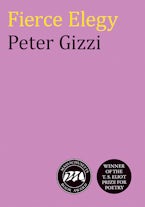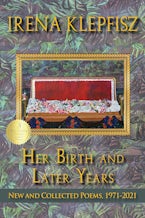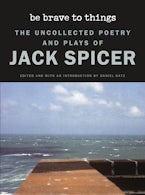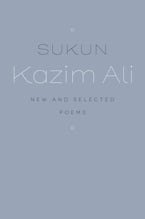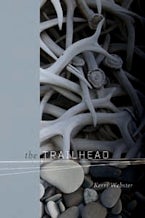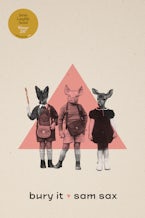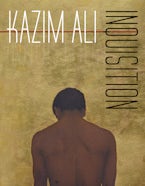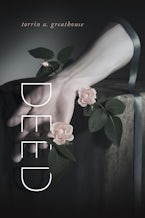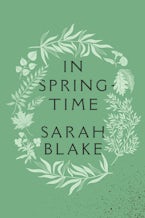- Home
- Wesleyan Poetry Series
- poetry
- The Wild Hunt Divinations
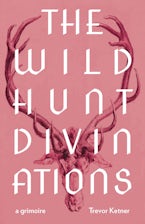
Shakespeare's 154 sonnets anagrammed into wildly new poems about queer desire and kink
The Wild Hunt Divinations: A Grimoire is a stunning second collection from National Poetry Series winner, Trevor Ketner. Comprised of 154 sonnets, each anagrammed line-by-line from Shakespeare's sonnets, the book refracts these lines through the thematic lens of transness, queer desire, kink, and British paganism. The sonnets come together to form a grimoire that casts a trancelike and intense spell on the reader. Centered on love and desire in the English canon, this collection speaks to the ever-emerging and beautiful manifestations of queer love and desire. Relentless, excessive, wild, and tender, The Wild Hunt Divinations: A Grimoire sets itself to chanting from beginning to end.
When forty winters shall beseige thy brow,
gowns web (herb hysteria)—let's thin flowery
then—gaudy bicep—insistent herd—leaf dyed
to holy doorway—hunt syrups—doze—given
that i swallow debt, let me whorl—feed lard
/ ale / ill breath—they get eye winks—husband,
of thudhurt, eyeray, saltwar—sheets yell,
tan—nude hyphen—i knot woe; sinewy, it sees
fingernails (limp waters, a hand sea), leather sets,
meshes—hewed out virus—debauchery: try a mop
or a match—i hot—i lucid—i wonderflush—stiffens:
exoskeleton / cum—cuddly human mass—la,
sings a boyish brute in his coven—cut—yep,
hood him—we want a wren duet / to be shelter,
a trans thud, sob, melt—oh, welt / honeyed wife.
[From fairest creatures we desire increase] • [When forty winters shall beseige thy brow,] • [Look in thy glass, and tell the face thou viewest] • [Unthrifty loveliness, why dost thou spend] • [Those hours, that with gentle work did frame] • [Then let not winter's ragged hand deface] • [Lo! in the orient when the gracious light] • [Music to hear, why hear'st thou music sadly?] • [Is it for fear to wet a widow's eye] • [For shame! deny that thou bear'st love to any] • [As fast as thou shalt wane, so fast thou growest] • [When I do count the clock that tells the time] • [O, that you were yourself! but, love, you are] • [Not from the stars do I my judgment pluck] • [When I consider every thing that grows] • [But wherefore do not you a mightier way] • [Who will believe my verse in time to come] • [Shall I compare thee to a summer's day?] • [Devouring Time, blunt thou the lion's paws] • [A woman's face with Nature's own hand painted] • [So is it not with me as with that Muse] • [Myglass shall not persuade me I am old,] • [As an unperfect actor on the stage] • [Mine eye hath play'd the painter and hath stell'd] • [Let those who are in favour with their stars] • [Lord of my love, to whom in vassalage] • [Weary with toil, I haste me to my bed,] • [How can I then return in happy plight] • [When, in disgrace with fortune and men's eyes] • [When to the sessions of sweet silent thought] • [Thy bosom is endeared with all hearts] • [If thou survive my well-contented day] • [Full many a glorious morning have I seen] • [Why didst thou promise such a beauteous day,] • [No more be grieved at that which thou hast done:] • [Let me confess that we two must be twain,] • [As a decrepit father takes delight] • [How can my Muse want subject to invent,] • [O, how thy worth with manners may I sing] • [Take all my loves, my love, yea, take them all;] • [Those petty wrongs that liberty commits,] • [That thou hast her, it is not all my grief,] • [When most I wink, then do mine eyes best see,] • [If the dull substance of my flesh were thought,] • [The other two, slight air and purging fire,] • [Mine eye and heart are at a mortal war] • [Betwixt mine eye and heart a league is took] • [How careful was I, when I took my way,] • [Against that time, if ever that time come,] • [How heavy do I journey on the way,] • [Thus can my love excuse the slow offence] • [So am I as the rich, whose blessed key] • [What is your substance, whereof are you made,] • [O, how much more doth beauty beauteous seem] • [Not marble, nor the gilded monuments] • [Sweet love, renew thy force; be it not said] • [Being your —, what should I do but tend] • [That god forbid that made me first your —,] • [If there be nothing new, but that which is] • [Like as the waves make towards the pebbled shore,] • [Is it thy will thy image should keep open] • [Sin of self-love possesseth all mine eye] • [Against my love shall be, as I am now,] • [When I have seen by Time's fell hand defaced] • [Since brass, nor stone, nor earth, nor boundless sea,] • [Tired with all these, for restful death I cry,] • [Ah! wherefore with infection should he live,] • [Thus is his cheek the map of days outworn,] • [Those parts of thee that the world's eye doth view] • [That thou art blamed shall not be thy defect,] • [No longer mourn for me when I am dead] • [O, lest the world should task you to recite] • [That time of year thou mayst in me behold] • [But be contented: when that fell arrest] • [So are you to my thoughts as food to life] • [Why is my verse so barren of new pride,] • [Thy glass will show thee how thy beauties wear,] •[So oft have I invoked thee for my Muse] • [Whilst I alone did call upon thy aid,] • [O, how I faint when I of you do write,] • [Or I shall live your epitaph to make,] • [I grant thou wert not married to my Muse] • [I never saw that you did painting need] • [Who is it that says most? which can say more] • [My tongue-tied Muse in manners holds her still] • [Was it the proud full sail of his great verse,] • [Farewell! thou art too dear for my possessing,] • [When thou shalt be disposed to set me light,] • [Say that thou didst forsake me for some fault,] • [Then hate me when thou wilt; if ever, now;] • [Some glory in their birth, some in their skill,] • [But do thy worst to steal thyself away,] • [So shall I live, supposing thou art true,] • [They that have power to hurt and will do none,] • [How sweet and lovely dost thou make the shame] • [Some say thy fault is youth, some wantonness] • [How like a winter hath my absence been] • [From you have I been absent in the spring,] • [The forward violet thus did I chide:] • [Where art thou, Muse, that thou forget'st so long] • [O truant Muse, what shall be thy amends] • [My love is strengthen'd, though more weak in seeming;] • [Alack, what poverty my Muse brings forth,] • [To me, fair friend, you never can be old,] • [Let not my love be call'd idolatry] • [When in the chronicle of wasted time] • [Not mine own fears, nor the prophetic soul] • [What's in the brain that ink may character] • [O, never say that I was false of heart,] • [Alas, 'tis true I have gone here and there] • [O, for my sake do you with Fortune chide,] • [Your love and pity doth the impression fill] • [Since I left you, mine eye is in my mind;] • [Or whether doth my mind, being crown'd with you,] • [Those lines that I before have writ do lie,] • [Let me not to the marriage of true minds] • [Accuse me thus: that I have scanted all] • [Like as, to make our appetites more keen,] • [What potions have I drunk of Siren tears,] • [That you were once unkind befriends me now,] • ['Tis better to be vile than vile esteem'd,] • [Thy gift, thy tables, are within my brain] • [No, Time, thou shalt not boast that I do change:] • [If my dear love were but the child of state,] • [Were 't aught to me I bore the canopy,] • [O thou, my lovely boy, who in thy power] • [In the old age black was not counted fair,] • [How oft, when thou, my music, music play'st,] • [The expense of spirit in a waste of shame] • [My mistress' eyes are nothing like the sun;] • [Thou art as tyrannous, so as thou art,] • [Thine eyes I love, and they, as pitying me,] • [Beshrew that heart that makes my heart to groan] • [So, now I have confess'd that he is thine,] • [Whoever hath her wish, thou hast thy 'Will,'] • [If thy soul cheque thee that I come so near,] • [Thou blind fool, Love, what dost thou to mine eyes,] • [When my love swears that she is made of truth] • [O, call not me to justify the wrong] • [Be wise as thou art cruel; do not press] • [In faith, I do not love thee with mine eyes,] • [Love is my sin and thy dear virtue hate,] •[Lo! as a careful housewife runs to catch] • [Two loves I have of comfort and despair,] • [Those lips that Love's own hand did make] • [Poor soul, the centre of my sinful earth,] • [My love is as a fever, longing still] • [O me, what eyes hath Love put in my head,] • [Canst thou, O cruel! say I love thee not,] • [O, from what power hast thou this powerful might] • [Love is too young to know what conscience is;] • [In loving thee thou know'st I am forsworn,] • [Cupid laid by his brand, and fell asleep:] • [The little Love-god lying once asleep] • On the Construction of the Text • Notes • Acknowledgements
TREVOR KETNER (New York, NY) is the author of [WHITE], a winner of the National Poetry Series. They are also the author of Major Arcana: Minneapolis, winner of the Burnside Review award. They have been published in The Brooklyn Rail, New England Review, Lambda Literary, and elsewhere. A 2020 Lambda Literary Fellow, they have been a Poets House Emerging Poets Fellow, Emerge-Surface-Be Fellow for The Poetry Project, and a Saltonstall Foundation for the Arts Fellow.
"Across a joyful space of patter, patterns and propulsive sound, Ketner writes a lyric energized as much as the original might have appeared to contemporary audiences in the Elizabethan era, updating content, concerns and perspectives, but allowing the elements of what might be possible through a language that could never have been previously imagined."
~rob mclennan, rob mclennan's blog
"Sexy, queer, and contemporary, Ketner's thrilling anagrammatic sonnets reinvent and permute Shakespeare while exploring the possibilities inherent in the combinatorial game of language."
~Lillian-Yvonne Bertram, author of Travesty Generator
"Ketner's process represents a radical intersection between the traditional and the subversive, the near-mathematical and the improvisational. Artfulness is the key—instigation, invention, rejuvenation. The result offers poems that honor and uncloset Shakespeare while managing to be entirely themselves."
~Diane Seuss, author of frank: sonnets
"This is Shakespeare in Emily Dickinson drag by way of Dodie Bellamy's Cunt-Ups... Ketner's project brings to the surface a renegade queerness that was (apparently) always available through the matter of Shakespeare's sonnets."
~Eric Sneathen, Poetry Foundation

